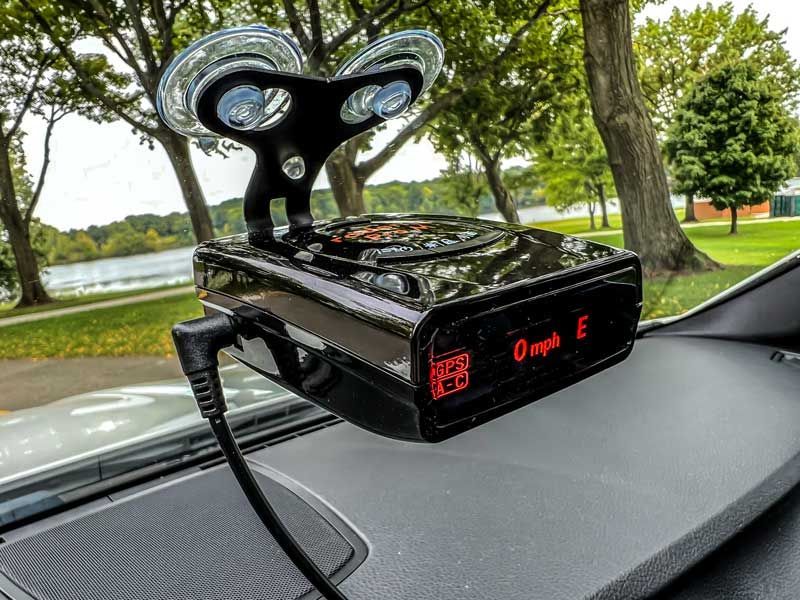Are Radar Detectors Legal?

Some of the links on this page may link to our affiliates. Learn more about our affiliate policies.
Last Updated: March 17, 2023
A radar detector is a must-have device if you drive a car frequently. When driving a vehicle, you need to be very careful with your speed to avoid getting tickets. The car radar detectors make it possible to avoid being issued speeding tickets and traffic violations. A radar detector is a functional electronic device that can go hand-in-hand with the dash camera. It saves you from getting speed tickets by detecting police radar waves. In addition, this device can warn you visually and audibly, so you can slow down your speed in time.
Car radar detectors are helpful devices, but many drivers hesitate to install them in their vehicles due to the lack of knowledge on the eligibility of their uses. We get a lot of questions about whether radar detectors are legal in my state. It is vital to get concerned about the eligibility of using a radar detector because fines and penalties for using an illegal product are considerably higher than a traffic violation or speeding ticket.
Radar detectors and laser jammers are primarily legal in the United States, with some exceptions. Millions of drivers in the U.S. use car radar detectors every day. They are also sold in many online and onsite stores. You might have heard that these devices are not legal despite their excessive usage. So, is it true? Are laser jammers and radar detectors legal in your state? Please read on to get the precise answer to this perplexing question.
Radar Detectors and their Working
Radar detectors are valuable electronic devices that detect the radar waves used by police with radar guns to measure your vehicle's travel speed. These devices work well for both personal and commercial vehicles. Police officers and other law enforcement use radar guns to catch a speeding car.
Their radar guns emit invisible waves that operate on three different brands of radar signals: the x band, k band, and ka band. These invisible waves detect the speeding car and then bounce back to notice the car's travel speed.
Radar detectors can detect the invisible waves of radar guns to emit visual or audio alerts to signify that slow your speed within the speed limit; otherwise, you will be in trouble.
It is worth mentioning that radar detectors are not 100% accurate, as they can sometimes provide fake alerts. The device often warns even if there is no real danger. Premium radar detectors use advanced technologies to eradicate or minimize these false alerts.
Are Radar Detectors Legal in Your State?

Many people ask, are radar detectors legal? The answer to this question varies significantly from state to state. Generally, these devices are legal in most states of the United States because they are intended to help drivers be mindful of their driving speeds. However, in some states, authorities believe that radar detectors should be illegal, as they promote reckless and dangerous driving. They also claim that drivers follow specific speed limits more carefully without car radar detectors.
Using a car radar detector is legal in almost every state of the country except Washington, D.C., Virginia, and Iowa. In comparison, the radar detector laws in the District of Columbia and Virginia have some gray areas. For example, it is legal to have a radar detector in Virginia as long as it is not accessible to the occupants of the vehicles. However, according to the authorities of Virginia, you may have to face up to a $250 fine for violating the laws for radar detectors. Plus, police officers will also confiscate the device on the spot if they have found a radar detector in your car.
Radar Detectors for Commercial Vehicles
Radar detectors are not legal to install in any commercial vehicle weighing more than 10,000 Ibs in all the states. In contrast, radar detectors for commercial vehicles weighing less than 10,000 Ibs are legal in many states except Washington D.C., Virginia, New Jersey, Minnesota, Iowa, and Illinois.
Radar detectors are not legal, even if the unit is off while driving an 18-wheeler for interstate commerce.
Are Laser Jammers and Radar Detectors Legal in My State?
Scramblers or radar jammers are illegal to use in all 50 states, as they interface with a broader signal law enforcement and police officers use to detect speeding vehicles. In addition, some country law states that radar jammers are malicious interferences that can cause airplane problems. If law enforcement finds you with radar jammers in your vehicles, it can result in jail times or heavy fines.
Unlike radar jammers, laser jammers are illegal to use only in a few states, such as Virginia, Washington D.C., Tennessee, Utah, Texas, South Carolina, Nebraska, Oklahoma, Minnesota, Colorado, Illinois, and California.
Types of Radar Detectors
Mainly, you will find the two types of radar detectors available in the market:
Dash/Window Mounted Radar Detectors
These radar detectors are more common. They are attached to the dashboard or windshield of the car with suction cup mounts. Dash/window radar detectors are easy to take off at any time. And they can also be transferred to another. In addition, these radar detectors are compatible with any vehicle with a windshield.
Custom Installed Radar Detectors
Custom-installed radar detectors are less common than dash radar detectors but are reliable. A regular radar detector has all its components inside a single unit, but custom-installed devices integrate these parts into the vehicle. For instance, an antenna can be hidden in the front of rare bumpers, and the display can be combined with the central console of your car.
Radar Detectors in the United States
Each province and state in North America have different laws and rules for using car radar detectors, but they are legal in many areas. At the federal level, no rules prohibit the ownership of radar detectors, sales, or use for commercial and non-commercial vehicles. On the other hand, at the state level, only a few states prohibit radar detectors' usage, sale, and ownership.
Here is an overview of radar detection laws in different states of the country:
- Alaska: Laser jammers and radar detectors are legal
- Alabama: Laser jammers and radar detectors are legal
- Arkansas: Laser jammers and radar detectors are legal
- California: Laser jammers are illegal, but radar detectors are permitted if they are mounted on the dashboard
- Colorado: Laser jammers are unlawful, but radar detectors are legal
- Connecticut: Laser jammers and radar detectors are legal
- Delaware: Laser jammers and radar detectors are legal for private vehicles
- Florida: Laser jammers and radar detectors are legal
- Georgia: Laser jammers and radar detectors are legal for personal vehicles
- Hawaii: Laser jammers and radar detectors are legal
- Idaho: Laser jammers and radar detectors are permitted
- Illinois: Radar detectors are allowed, but laser jammers are illegal
- Indiana: Laser jammers and radar detectors are legal
- Iowa: Laser jammers and radar detectors are illegal
- Kentucky: Laser jammers and radar detectors are legal
- Kansas: Laser jammers and radar detectors are legal
- Louisiana: Laser jammers and radar detectors are legal
- Maine: Laser jammers and radar detectors are legal
- Massachusetts: Laser jammers and radar detectors are legal
- Maryland: Laser jammers and radar detectors are legal for private vehicles
- Maine: Laser jammers and radar detectors are legal
- Michigan: Laser jammers and radar detectors are legal
- Minnesota: laser jammers and radar detectors are not permitted for commercial vehicles
- Mississippi: Laser jammers and radar detectors are legal
- Montana: Laser jammers and radar detectors are legal
- Missouri: Laser jammers and radar detectors are legal
- Nevada: Laser jammers and radar detectors are legal
- Nebraska: Radar detectors are legal, but laser jammers are not permitted
- New Jersey: Laser jammers and radar detectors are legal, but they are not allowed for commercial vehicles
- New Hampshire: Laser jammers and radar detectors are legal for private vehicles
- New York: Laser jammers and radar detectors are legal, but you can't use radar detectors for commercial vehicles
- New Mexico: Laser jammers and radar detectors are permitted for private vehicles
- North Carolina: Laser jammers and radar detectors are legal
- North Dakota: Laser jammers and radar detectors are legal
- Oregon: Laser jammers and radar detectors are legal
- Oklahoma: Laser jammers and radar detectors are permitted for private vehicles
- Ohio: Laser jammers and radar detectors are legal
- Pennsylvania: Laser jammers and radar detectors are legal
- Rhode Island: Laser jammers and radar detectors are legal
- South Carolina: Radar detectors are legal, but laser jammers are not permitted
- South Dakota: Laser jammers and radar detectors are legal
- Tennessee: Radar detectors are allowed, but laser jammers are illegal
- Texas: Radar detectors are legal for personal vehicles, but laser jammers are not allowed
- Utah: Radar detectors are permitted, but laser jammers are illegal
- Vermont: Laser jammers and radar detectors are legal
- Virginia: Laser jammers and radar detectors are illegal
- West Virginia: Laser jammers and radar detectors are legal
- Wisconsin: Laser jammers and radar detectors are permitted only for private vehicles
- Washington D.C.: Laser jammers and radar detectors are illegal
- Wyoming: Laser jammers and radar detectors are legal
Bottom Line
Radar detectors are valuable electronic devices that can help drivers attain the recommended speed before facing any trouble, but they are not legal to use in some states. You can check our list to determine if your state's radar detectors are legal.

Steven Dillon
Author
Steven is the founder and product tested for The Car Data, that has extensive knowledge in automotive industry. While most of his free time he participates in typical "car guy" activities, his passion for cars, data analytics, and tech, always has his looking for the next cool tool, software, trend, etc. to share with his audience on The Car Data or on his Instagram.
